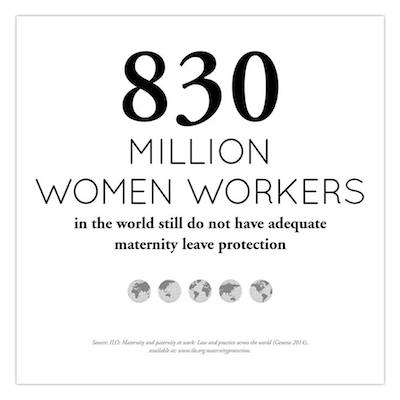As brands become increasingly transparent in their business practices, employee benefit programs have been put into the limelight, with many groups publicizing initiatives intended for work-life balance.
Sustainability is as popular as ever, with luxury conglomerates such as Kering Group and LVMH emphasizing and sharing their ethical, environmentally friendly efforts to demonstrate their corporate social responsibility to consumers. Internally, employees are a brand's’ most valuable and vocal advocates as they live and breath the ethos of a given house, making quality of life while at work an important support factor, especially as many brands struggle to find and retain talent.
"Employee quality of life is on the rise," said Rebecca Miller, CEO of Miller & Company. "The classic major needs identified as the most important to culling and retaining employees include esteem, actualization, economics and family, and health and safety.
"With the focus today on ethical, sustainable and humane as it relates to sourcing and production of product and working conditions, a new lens has been added to the talent companies require to create, produce and market their goods and services," she said. "This lens is viewed by the consumer, and their demand for more transparency, as a tool of measurement, confirming or rejecting a brand based on the alignment or lack thereof with their values.
"The consumer’s new paradigm consists of Values=Value. This same measurement is viewed by employees and prospective hires when considering staying with or joining a brand or company."
Invest within
Strategic sustainability should be focused, starting from a brand’s interior before radiating outward toward consumers. Employee quality of life can be a part of a brand’s DNA, as it is with Italian apparel label Brunello Cucinelli.
Namesake brand chairman and CEO, Mr. Cucinelli considers himself a custodian and has established an authentic workplace culture that promotes humankind with little harm, further fostering human dignity.
To achieve this feat for its 1,500-strong employees, the workday has a hard daily end time of 5:30 p.m., because he fears disrupting quality of life, resulting in a 1.1 percent absentee rate, much lower than the average (see story).

Image courtesy of Brunello Cucinelli
The availability of supportive parental leave programs is also a method to promote a healthy workplace, personal life balance, which in turn fosters employee retention as well as advocacy.
France’s Kering Group furthered its advocacy for women’s rights with the introduction of a parental leave policy for all employees globally.
The length of maternity leave, and whether the period away from work is paid, fully or at a lower salary, has become a passionate issue for many women and their partners. With no true workplace standard and a lack of government mandates in many countries, companies with policies that support employees’ desires to have children will be better received than those who do not implement leave programs.
As of Jan. 1, 2017, employees of Kering’s corporate offices as well as those working for brands within its stable for more than a year will be eligible for parental leave.
Kering employs more than 38,500 employees in about 60 countries. Given its global reach, it is likely that many of its employees’ home countries do not offer such programs for those beginning or growing their families (see story).

Kering shared maternity leave statistics prior to its policy update Jan. 1
Brands must recognize that corporate culture has to be arranged in such a way that employees can "live" the brand values each and every day, says Boston Consulting Group.
Building off of this, employees make the best brand ambassadors and gatekeepers. Employees both get the word out about a brand and can ensure that the brand's decisions are culturally sound (see story).
These efforts can also be applied to programs that take the success of a brand and pass the “wealth” down to its employees, as an acknowledgment that none of the brand’s happenings are possible without loyal, steadfast employees.
For example, online retailer Farfetch is letting all employees benefit from its success with the introduction of a share option scheme.
Effective Feb. 1, Farfetch’s 1,300 employees, from junior staff to C-suite executives, will be offered share options through the “Farfetch For All” initiative, which includes all staff members across the company's 11 global offices.

Image courtesy of Farfetch
The investment scheme to reward Farfetch employees will equate to an investment of $40 million, based on the retailer’s last valuation. To date, the scheme is the single largest investment Farfetch has made and is a direct reflection of the retailer’s commitment to invest in its talent (see story).
"A brand whose culture advances better life work balance is in a stronger position to attract and retain top talent," Ms. Miller said. "This advantage stretches across all generations and all levels of employees."
Future hires
Luxury’s dedication to educational programs is a forward-looking way to invest in potential employees who are still honing their skills. Today’s hiring climate has proved challenging for luxury brands seeking qualified talent as many career-aged individuals are shying away from traditional crafts and artisanship.
By partnering with educational institutions or establishing innovative think tanks, brands are placing value on future talent.
French luxury conglomerate LVMH, for instance, just announced it plans to invest further into London’s Central Saint Martins, whose alums include Alexander McQueen and Stella McCartney.
For the last six years, LVMH has invested in Central Saint Martins and will continue doing so for the next four years. The undisclosed amount of funding will be used to develop sustainability and innovation programming as well as grant scholarships.
In addition, Yoox Net-A-Porter Group partnered with Bologna Business School in March 2016 to launch a Center for Digital Business Education, combining their collective ecommerce expertise to help train managerial candidates for an increasingly digital world.
The first managerial education program focusing specifically on digital business offers master's degree programs aimed at both new graduates and those with some years of on-the-job experience. Luxury brands have identified technology as a key area where finding qualified talent is especially hard, making this initiative a means to ensure that both Yoox Net-A-Porter and other business navigate the digital shift (see story).
"Education is another vital aspect to ensure a brands future," Ms. Miller said. "Valued employees are a brand’s front line, their ambassadors, their gatekeepers, their future. LVMH and Central Saint Martins recently collaborated on a program combining 'disruptive thinking and sustainable practice' creating 'holistic solutions that balance the needs of people, planet and business.'
"Employees are at the core of every business," she said. "Leaders who understand and value human capital as their greatest asset – respect, nurture, develop and hold it accountable see the investment reflected on their bottom line.
"Successful brands invest the same respect and monies in their teams as they do their best customers."
{"ct":"6YhS7ERBplN0LVwvfLlh\/4TLcFgWGl3in8CBKyWQiZIpXGJYTxN2qiFpnJ8aJTLscqk0KQL\/Ju7Xfy4tZ5Kkuo6m23uw0lqM\/JoCzfqFfUG7f+EushjpdEa7NTaPGbV97uEUnyjMAQsyDsXtnA60zCdBu\/GtJBAFQBCdFVW5k+oHq5BwVCIFOpCf\/Xj\/sOsf6Xr1aAqf+jXTua2hPVHD9FU84+A3BfV6zOicgOph9qN7NuvOLnv13e+2bcdRjVSBy+N1BrY867ayVL2mSjJ8tLxWFCwfEpB5sM\/xwJVSGKLDlqSrKCR7m6U+hJT4CgJLnZKmZDmHuAQogfZif5sEp5zlMQ6xJY5Ym\/zQ4csYFOXf1+su\/spQBC48YKCxgz2W\/giUDL9mj3RpEKPxOLwbwayW45YKURywxVVml+xmkonn4X68waOteaiDlFW8Hsgncc60MoOXLGBWUBYHzt8+MRrB\/OBjhs3BvrkOlI28u1+0lHfac4lMue0J0RujJIfFqfT87uKN1bUHZvK6dwz5T5Fhs7C+7HiAYZLjLetMY0Wcy2mNZeJ2hmsKKwDVCPiPomR\/V5jW\/BnJurMMKalMfQWuTNWhTpQuS\/kefDUJ97vozF62j5gmzuiLWAy07YBqf9tumYnCPCznrw7ZAfugvtuG4V1Dcda0uNymg8U2VHHPqLLITd09BPyMiTVAb\/6HrXNVdpYm19tisJE\/GU4XKbv46md27dCdJMmiMYUUZ5B4PaYNtVHzUun5\/MfUUXxiIfoUUx\/+0p7PRsnZ2b9OF79f32wkr7G7FhVxwLu568l5d7hk\/AD8e0n4mmLlPMCSXjUG2DLYPB3t8L76+nSk4m\/oEVLq3KXsXd2hfryZ5Ghe5XPWe5mo+fDPtU1+7OsHwgeOgrTuMIj4aSlySeW9\/nGXjj08gHu8CdgfHPSxTII9\/gxyDlEghZ\/\/5cCcZoYILhsnMyYF7x37zSgE8ebodr5U1BnPPbCCXspTlUQ45qKOPmY2d+DuAj8uB1nl0pXN2XzEFXw7BtnMbA6iOXB+XJv4f1kBfdTb+UYH99ciCvN7npTMBPJZx012KVBKE\/tb\/AYJox0doBMDRFPQ0d76r6uK4dEdpLeYXyzpubuaUgXSdqMDLUk5Xr44Frqnp8KiWGrWwHSYKzd+1t9CWjsBFmQpqgfg4kemLgBIYaNSW0UgTjL\/FhN5JpVE+KOpMAOS5+pzmE6rxdZVK6DSOXwvNpq4bfgcsUtxr9dreUugp113lhw0pVn6+QeQkLWz8uZWkrcIELV\/D5LijH\/HuHBVDNil1gHAAapkm4hujowSB9IC3+YpGUtPXnJzHE522IEMaCM3SvguBZEI2kYPznz0kg57XcA0R8\/hCAdqghsF+Xf+Vf18an2cB+dbd6cwUCuE7FpQJ4Spk2q+NWF75c1WDXdjWbs2\/bIjlHwQgoBiWO+mw0EjgEEtEBbvQOvF4V35hU5WUYfC3GOU0aqITevYuyNSFHZ5bSMWhZ\/hiI6sjCUT04mSu8KyVdC8PUCL2zLUrrXP1tEWVIA6Cs06QesJmv9yn4zmbyca0yTiLQdYGy\/JG7MAgWAgHFpjHGWs\/DD2tFnNtDxaz5iOkJnMo6vKGGF4W1PAZ9dG4OccZ\/KEu4MPRqbkffIs5xJS5yJuKwXPGYrRfo1hT4CEn4cucc82bXxW1wwXX92Oi34FZg+vQsA2RmFeIVMYpOnYSLvgCqjAYdoQOBvIlaPiLojzTNGuVhHmJuFVigCzQqWNohvA7mtHc+NHl4QAlgHaTwotKl1BFZ1syuTcZ6pQ+QxBoK0WFinGtrgALbw\/\/cimKNSzS8Oplp3gZHQna3eI7cimX4nzQ2omUbTIwcE7eZUqHjCV0GoWxAbf6fiQs0aRDjtA7fxUih7XmfuDb+Wrn9mguVhd+jb3pw7V5ANanEXAgn1bIw4iqua5v\/3\/pbDEfzgj9SafwNanF05r3xVwuroSUf3m0yAJyUGUxQa1ELhX5AJxINwtSDbHISiW6HHDyQkHxL6iq9grglgEBber4bj9\/bUggszDOzXK9oxI0YZ7RAKd+HtX9v6g8oKPCNOYbJT+grV66QUmRgB2Zv49cjYsyx\/cqmoaDnJE7PwNfna3jY\/apE4LB3uTa7wbWWjZ+GIX3vRDhim8ELV5XFAcChM\/DAEoBM4q9yu3EGJQCXPubOJ8cjFXqtt6kl8LKlNj1UKYNs3+4Geq\/lSODqv+E6e1Qfo7uNcbcUP+fdEu6rDy2+9aYYaCR6zQlVe+cTJDEUV3d4VEER6wtsDv603fXJPL89JldWYFQsuafbukNNzTipMwjmKFjQk0mfjlX1fN6mRsqQcdeX4gut15zhYcm1WBJ+V5c+5bIe7ZmiVZuodeuqxD25h0ocBn3wH7dHZaSNqudAq9TW24hzQjaraBA32+cFNNwhk9WbsFKtz4yH3JJatoCT0HgBWVgb+ml0ia0gNXSJm5E8vWj\/nr82y0CE7rOe0qLmbwdai8sO1vOWwL\/uBZlSgTDATMWp7gCLd6dOsuW3xv0dxkL2uQpnOAyuNQcTtnga8+R5aHlQmaIOe37Yw7dzBN6PclbOnEJh1e4k18b0pfN2e5OdyBUdtlGzMPLEx\/WZoAif7bhW9FlFHbHj6QCOzNRyZMkarucvUPy2xapBkwListL07zBwot2WdA04oLiSKalQFebuT1XXwgb6+AkiG1pBeM1L7gQWPhEtIPWFq0W9rs408pA7iOQ5T6C0PV+KCV9dIB1e9AzQXWG+6dNj+UmuBl0xoMOqzEr72MNYh+wbtyY1El\/DrTkelm6paNB0P2ub6Dof\/IaJWOiB29+DasS3lDg1uey\/Eql\/6R\/iGMmbxmOc8JYn+abeObfh7nrY4K1OHhgFsE3Mn\/x3E7hjH5egm00oMlzvglZlDz\/MfF3BHKmwXWm\/d7gasyjlYLyFk00FNYVqrFcQN3Lx7dqDQTGDdmmLDe9SJUn1dZZ1F3MRXeWYtkWAvQcmsG5j4YRQFSAESKUn60VCESMT8Yowl8hv\/yLlFFZFA3E8SWU75qgvjVBp4utLKnhkbLBW37BT1ZpA+eQVyya1wNJzJStJ5YQCMCPFysOhY+tdFfISiYO0GLSAthXYeeRcREDdKuNeEgFYWdbZkCF3nJO1ZEuboeoUx3xNk6C5QT67UIFnSAKdyEAkwD27UMCJ85iIn9zAvPOCegBIo0Po891AS\/9QX0F+nHqRMnp\/iYLC8rfNI6fKXry1PlCbJNnRyEYOMbzT3bnPgDeBC4j3J3e0kbsKeV661H3cKpq8DqB3lcMJ1OWFrqjIuI4Lbh0lBrqLoRvoIk73YHn8UiHC0BX5Z7Ye\/juxPUsYFXaf4MdkZEvDpp9JEZs6+ax\/DwT9+KwGs7Xe2Wgmwau4\/jP5OmK3VkS03qFOchgM6VkGT9sfYxiLAzbw2xjDTVOYfATnpcIwSylu28dlpG5zL8PIJSd9bCmJ9uJ6Elmt6Ei5V0AwFevAEMlApRs81gwaAzH0BRoGzpJ1BgkiP7IfX9+UrMZRAcj69TT3m3FlL8ILsalNyTD9kauc7LUcnHy683sT1Dm2DllwZlNU55rebxh\/Nx+yq+OrctkMsQUNCcxtAK7vlAsoufmD81y2t3vJx2GMeInLQ8k7\/hHsEsI7m7sfH79isB+coVdX292XA18EgNAM3\/e\/w78ImTFCG69xWMUyUq1TdcfEqHe12bfPlpbvSVbV6GjJbZTZoZDNZiwsmWEz\/zORv5Zy8kLXrggvt6h5tNDDyqkfU+70FjqbWHKYx5s\/rtZ24BPDOHikuiUOUAkr\/eLeK9oTVlirygDa5Gof9Fr0G8S\/EDX+a+CfgjBKiYFxxAmcTvgnSJdP5sphQcTyTJn5SnHMnTgR9GYs4VzODUKc2jgmF5HnBhE2H8aVnDH6NDmFhvWtYQSPFgo2QhRRAMeV9APRyEhvwR+\/exGy2tb6GE3RhkqaMSiz7kGzVS0zCt6cMLjHWp0CpxdRwh1acFpu8hWXKxWRoZG7mTjlaTpDfd8Zm1fMSaDBJ\/d7szm1zqfJwCESyZelTi\/8tLF0EE1Ks38THmbB8E10oBSzJCzHkD09WoDUAl1ncTW3yjllqLG04hEgWKe2xuH2dVslMnsWwLTdO4YlN2DDtz47pO+wrQOayhT39BUhuJR35oVcciUpEYrTrPLehoSwXM2NwGxXdLMguTq2KmBKr402DKxfkYnnR5X5TZwXGPwyiO294Texs5U6m3k1MPdx3\/Dh3vpMy4FmIbVYNPPBO41jsas7rf7oeGGVmvu\/6t8Jz04ZXfJF6vB15lliR8\/igNCW0AV2NAdaS4LcdKW7uZWsDxl4frk8oKtRxSg4RK0TmiQ\/4aKmJRokni4tAhNDNu8j2YioMU+kfKllHRRF6mamF+HNvQ2hdBRpCix0r4qwjLgMuEfzt6Qa2lR2O1Uj1JL2HE69RdblDEi5WxAWDhPmK8riPfOXN8o2qixOvRgNm7KSHtYZKjO7ykVvXTCCxpJWg45ls\/fEkZ3lyHwVU6xXrQPr6YLyDeFju265nhkqLNVEIltyb3SGomWottMAQ6mpfzR\/oZFiOetuyYU5COn+41fEoRLOa\/iJ27Bn1evKUKU9Apc\/4URlja2kzpLS+f5264qFGYjmn\/CRJRkwcxuJFAk+ZDdmWfZegnomTzWtywYBkgPqT3pbopHIaWvncGYc1DX1c3QOvua+vgHLAbIPbQTCThKr1N8I1kBsAF7Hyi6O\/bLYfvH\/f5PoeLFVMdy+hT8EB+FCcuiZkCO+6csk7AzZLSbo62mFn9eZENxXT7wGr6q8e5DvrFrzg526Q1YvdAii7s\/q\/Wez7GAXElcqqjcSy6YMnw16OTTLYiZL208CW7MUjIQvUoNDq2r\/txEGG\/71CNMJvmnTKDeWdZAwS9ScBRXPGop20y9iNZ9tqQv1nMfJQYB2kjlAIlmkjsrivyu6IH3GaTBsvZshujd6ZySV498aRnOEU1SIbi5HEzk97RdE3pIYZ1zP7WKvmpEogmVtlqKIpSZECTvyF4QcCaF9FsplHdgsGVxOOHXcAeK386SWi5cDBn6oV3OJkfBLvw2o+I0BKLBLO9WJxzzBbuEZb+lvzwimSN5tpmspjAes2dmTT4suCpPbgUPC8pbi191g0+QUOJyvp\/5eVy3t0OzvpyCQ2QkjP1oMlnKnHPnpUW+sDCigLD3Mly25cQxXKq091i8f3aEfA5Zto7GQa5ctqxFh+BFK9z3rgGoCJP7qpnhU7oWm\/nLJcpYzmL70l7ttSYx1DRCC0DezxEJ4lvddWtraz9nmByh8Gn+hvKdsZArYOztDDGkA7k3LQQ5UYBegViywk+pyM7h1N6TwnarBLkDVahJv4x09BY\/gMrcDHUiAxLFbq8GoWPsjVJz9ORVENyX48V2xbJ89jnILj9tG1\/a2KN2x7FzEijc7RDF71Y2nF\/Czk3lg621Bqt3LItrrluTcDjDSVU09wgUoNZn3o9mPSD59GM8hka+1bHQeTOsvU1yqGgH2e6EkcU+geAWU4gTwkeNk2zX59VshN3It3SOQjNE1hFRDfs6hlUsS0H17Ng+R+N60fJRcq6RNKnrw4uRP6mNguaKVbB\/lhNiaxQWPgjfp+CinSQoEudblX6z0Ct+rBsFvpAmvyRrsFCL+oYuukHoMeSSeuFZ6luU3W10JDv5n8J+XOguWARvlHYzmjbXzkIk9+N9H+0rFmD6Mqa8kQYhKd\/TSHPJ8DwYQIOvkL52C4jj3FdI4\/P5y8XT\/gIZ9xf9fy21vBquGtBSpN3AVAT3aMitZBzhgE3dt\/yMQg6Ma6nDZHylfqRjOBIcYJqARwC1lTpnJH9Nh8csAa2r0MLGaKaKa+0DBFR897MCfFZvsO7O8egaYL9aPWh3aDFmJbnmFrbVrcnAsnWsMFJVKXNg9VGBaBMWU9G4LaucHYvQmzqNcIFakHmp0XTE5WyWB1gmfF5xlXTHORzA6QBCV2t4UT71hQxuQnd8IgXsnyA4o7Mgm9f5cXUfsYd3kM4iprs+W1qbaq51wWK29r+MrCg27+v9NDCwN1RfXeVleQep9vaUBd6L8i9\/0wQcNpJGy9gIBNuGsDObkY\/Ool9tlVavSMppqLWjfPhkoNLUzM0tSn\/cWtA\/\/DaSSvtj\/jNTNPqZqmzW6Xu6+3+rMB5fwvZxVQnnZJHsQkTWGuzMYOFxyeW6Vyl0\/0oSslwXYoRlVCqTEpaNOseRunfwIwJLBXTa+2DFh4CKWgyXSBsBqPZWvGlXBq3P5yEWqKe+EYIApBbrWoZTE95WrqczLFgKUycF7GiSJf1Q9ZyrhS+4giEo4FtBSD1aETJU2ymZ3HX8m8MZwwYb8h239SQcLchYbO4AIBINh36Lrb\/K9mfQSfCP6EwwJstkj2MC4Uy90nzaL0ZI6sSN3Juh3kaQm2giqeiWgAWONguoQXm9MQfTVrerLR3SUAIj4oNmnfLnaDJ05zinZlZKTdQklNcHUoyqlxK+mllUvuTaeWD\/k1FFAqDPLqBvhKNNW+sapBD0dF8AQUHhKXjgV2Y38p9y4tlJ1cXOzKPpOdwFHzD7RaO2738G9GUa9aKBJ+1AwInCuGg8WsXlbcwQgSWWNAlKDi3i6hUds+57u0QRROVVNC\/ZqNm6KaGxi\/JeJXBztAKe5XczG\/BZNz5mkpSwYNgYVkG54RgeSLBdcgqSqgYfoLOOJuLKF\/TYZjJ\/oabjJ8GvSM5Ryh6tgOnxXGQ\/Vc92VSkjyxzS0jJLRAenO3LeMcuflUBGSR2hg22aDjfDhDhysc+4nSoEmRZtNApaZWiPWNoFjbRkxWy3PkLRz5sBxyRM+9KRiK\/W8f87ywR1Cc9zOmMWx9zzhbUj4jfuYNNf8AvZCbmMl4+6fZxVTVQHDxHbqz5y1gt3n3j8fInRPLnP9RRbt0YQ5WPSL+76m3\/dvjD9cSBbHmSJcjHCUQNGNOXzsuwrMavhW2IzFryaWZZ6g7Gl94r5QU2lg355iEs4WKBReMI48Q3Qy4Xd8SLkJ1kQ6WKug6Ftw5Me++5nOTlS7MTqjCafnU33Zl5EY2ijJAZF5TixD218lpkrb4s7az1BnfyjFU2M0uxw3RtD0HGavk1xUM83iPYdEBncLLRfZsGm0uY2nuLBmpCS\/nwlylk\/P2H5teICx3QeCetDwqpQRT+0brlmARkPjQvRWHc1SkrWhGldcsRPJTKfEr1ZHBm7a15U7VbgPIQp5FN0UOwTn37x5+oq4ebqjfZe2a60rZcJGW+4drLxmPdy84yHIobbHcf3ZzMLZdNl\/xQeyiouBHfkZrzFv8jZXyvXkkB1BUTiodjU6BdMDl\/MpJELfWXUIh\/oH4ajryPu4ApjKjoRSPWQQng4f23um8wFr8nPsq7BH7iOSyK1l6adyzyTReSoEABL1LqV+xl4dgRiFAYkmpyyTbbFFGWFoexg372ed+exHjglXRZhF1j4WE0JBLQAWtRMmfqTHQW7tcdFZXjLk\/q51MsXJ00bh55tIIGwB5hz1gylmfAZMsGfVjEI37gI3RAwA\/oxGqLHQwip\/BzuD9lda+ofCkZpc5nbvD3WxqA\/gHc2GCrMwE3aRN4E4tvkPm4QPPRDHYG2pWcZaeX1Yu4BKv8DMPXmBDHS0eJaQ1j+\/z\/LUa4N\/cYxVfxmV89b6pwwFko5ajqSxetHzhwybAmgV4TyU6+WM7G3G6rG+dS\/jrK3vFMQsqlCWHD49muuAng9AVCci7MNterQksRdhpZWX7SCwtLgzOL+MFFoj45Dl5o+33zEUTqbtouRNCM28z6+f5LbR8yT8DcozRaiE39nRmlSTLXYSe1BEh67izUko3W6+MSfAtzffT90LaH3YCI1QpcQSgg3nqC4B1ICd8M3qRr9B8EptFHZUlI9JvzxMCASZTFGGMwYPu0TkuaFmBf+NH0qCf6vovT3pZkxEZXoPE47mIwBZy2DTTkspbEV0DZ6CT40EC6QRW2601fMxUwfGeytTjgnMkPXIIwB\/6Gqy\/pkgxb+kOcEIwj0KyaTerzF5XgJVBStWSC3CwpV4a+XH+l\/+7FIcrHVQqXjcqWAF2PSqbQKMwcUDnhtQ6EoCzLAF6i9EPUOGeuZMFYmWg4Tv5N9+wAiU\/fNnvwZW4Bw6V2C5DI6W4QElF0Spwe6iVYeUgRDByO7H5gYQGIVgvO+kwTpqohzT9X5Ds63Yxs6jXC+MgjJKLx78p9FD6vfxxhaxt3\/Be2a2G6T7l+1yvSFLTfqaM4YSCZFrxub6+PpbTpYZEloGNAjjtT+al80HyHPPsGMgWFzTqkO86fw0BJBYsz2H1TFMvhAQim4URhpvayJyyOwjLzSZTN1abpsxcp+27hhbaZxpnoJKz2kkfXCBF\/Xh2kbeUMKhw+HKvFhDrayYTdiuVmLJMs7rpQdRiBUZfLW9H7GnGn0Lo382XGQGV4g9Rm6ieuRLn0ZoF5S7MDM\/FF8i4kZizkNvJVYnTKL37gWomxvxzpHb5NtgZ2s+cc4P7aHeC1IYLjlI2b5jbfroHjiTPPmSpdT4L5fWrGM3LV5PS3WFi++i0LtcOg75hrY\/VlDWHPqk\/8CRuH49Aj75t2E\/y2tKfyBKIkFqACw4tN7jPRSPKzwTlQKh\/wHUx4fjbd+Lgb29qI\/38231++dxHrMU9HmPf1YTORTTeCAGuPMD4dMDXwC7o69Xv+rajR7ckBjtmq+QMgY4Frp7dAipYg6vtmdwYgUgEhJt4HTIoR4yplfUxcEi8V40DBstwakCP9dPuDtxQXLA0gKbRH2Rm3R+UeMmV6JvbNVR1eGG3J6XAJWYpAB27kzQbFrbcUPNRBA4DRNmRdxwPGEPS\/o9odVfqljbgt74yKGncpMde\/0nFhLffs1TnKU08ZSuVBZhNhlEUEEixWRS9Qmv0tuVrI6KYUCoGUjF8AkjZ4oRk1H6OdykvOzMi5zLZMN\/dDYN0SqiXUvmVzgCK7Ni+C0xaYuq7g7jKn62K58w949Xs+QDQ2u\/jA3G0H7XaRK6qnNyiZJgorF\/XEr+kDpV29iAIqIEcBIJi5CCD7NnvkViPzg7bRcEH9xBXZ8d71DJnFzkH5+mDv9tYR8XOtr9L13MORd7J3SXhfy9XkxcdV64\/O1OLPjUNmlwJZyL6CTGFVC14\/LZ\/hiCIiMmofYmDjZ6U4Yr0Cyg1OManlkqsV8+adVrDIRmo7oQThZDxk2ynzp+25eDgGlk3wlME1ksQXZg157RUiU8GIUHBpEaOXeXD46K\/ebmfrpHXt1+Pk1Eu2Iwttx6QKBt71CaZCi2Iiu1+rG2MDAs0UjWUXnRT70FPB0OyzLBt6vlnsc2F4pAthAqR+KE+LhFQgRfATdlJhg5J2TeYDrwLEGD1zhLpZudvVw7DwFLDu1CUbT\/DD8TsLLd2him0hPWiEQBnyHQV+sS712hhIDS69Qdqy9BD5yVUBEayIgn8TGXOfDvr\/GCNjfkn4+mFP3cspLeuoUjpic1Do1Aoeo7vlbuR2fZHXjTWOWVk2U2EiALOqPg1baK3uxeELaAvaIuCiqp9Zlufa71l73CIR2ectowjCW4PHBW20PwyOqo5t3rlIP+kNdLrogeOU\/1t6TDnY\/e8pBfeZeivRAFba7NsoNxYhJjaSCpIayNg0gr14KgYOfY39bs1HzL4EYD2iP8b\/crk3vQHvwpIoHMwtocyfRci8BVHC+E6bEfIexR7MqPTSk+WSn61hKzeZsYWpVIIQl+TympXuTFDF0Q595ZujspX9GUuIrfSFz5sEneKCo9clkoLnTDJU7Hx6aFicWYVkf8GL75U0p2srnb7ggxTRr+sTH6rRFhvXeSQ7BDygp359FpkVexs1i2YyYfNlUHcd\/1jJu+sn9koyLC2hriOkm9LO0WohF8y9QwHdpiGDEQVn+g9oun0DHe2LPk\/8fXBguhKVT0Gugebb7FXPcWRU5yxx3UZlkyZjkIMOaX0w9MVZ+YSvpvuwiYP5HE9RnTCdCt2WIodZ79MhtB67mvbZPwSasL+ILPHXAQ5QJdOIbAnfEFAHygZtJnat+morzLEjIhhmV8AwxdsGAl7Jgl8VutJFII\/ry1\/udn2pOyoJAhfhsIx98OwdpPsNEnU4bcfeeqArCPkmUqeXnKD23cNwmM+kIekkM4gEvUIQg1FXD8FDJWnleWQnS4a86GE2Zvx4giRaZBIhrd\/r27pNWowTTRaSpcYyfsIvwOeZii\/o\/MOCRK5Rk9rREu8Ifn6Zx5Yw+wOZPUKhf7E9Qz8kzYWLsSwhQxeyGBZPvy9wBbqqM7ruLXrwb\/039KmwepUk\/PX9wdArGn15k0Zfvx9WQa5kuR+QtLIjy6+T0lzZDTHGXXnBkRf3dWTsiNfZLUnbfng1bF\/eZlE7v4jD2phkJz5cGPyVh7Och2yv2sfJWwOMtkSCe03HozPyPQNynzP68w3mtk7VmAQJS5JOwtCtMFxu2QjoxyW4KLJpD9M775lFzUxdWFEku4VyqzY073aUw4A1oIGvnVc9D8kWtjesmf7FoiQlGgwoyOE3LmXNwgUEHPhhlvJYDN80VYTAjuLHxvg+KhaZ2W1JwhfydQjcB3Z014XqIBnWU8CtbvYk\/z5EwFhVUNUzMyNzyLujMP\/o2EDqFobcVd4CL5vdOz2Wx8E829O8OzBglJWauz99MMIQ3QmFPlTQasDEKttRB4qeT5FXe782dGSJ3aHnaIFVL+Nwjrb7QwL9Sy+lRtCdgZ8Tii7NZFO4AT2OJPs09DbXWheGab2WlAp3ogrlbRz79BLKLykdp0zBMTV7ZJf\/LIkDQilhi3\/EOMXEOo0daW0zCSYuGMBVSPWvwjE1uqdX\/iaSfoaJgXNftBZqkY2ej1euD+NbEbq9rWC8bUuf5+RsS6kIpK0ogJwuD29St1NE0m89cLBqixDyrVDQ0M2n7brieGN39xUXkpqrQ\/NJLJHsRxpdK5E2Ge0gkAeX9zJMCuAX65PG0pGJ4EjuQ2yryQdRlcZ9ASY25btGfMM3YrA0A7JsXpPiaomypfqrCD\/igeFJlnM\/2GRNASgWj4EEDKvF6PEb2nqvwIAVod2c\/4hb3FXzHCIWFiGsdeptvOnVAGQl1mVfcE2Wc9N59xmG\/Kx3Zu0A9IRgmMwqPXXtwk8LRgPbgPQ\/XiOHgvc19ZnO7Rb1+lrkXjRovrY3RVJt1j9jIuHC3hNc+mXXAu3sHTbwG2zT424syIN2rnCEY1OLW1FPGNfOxy4+W\/WFl4Aiu\/HroZmEzeg4X6Z9XfsRbtwwd0yylEQovmgFdF7Qrel6JsGqSegIdfYlgVHtvzWNphKLP4NPCKbdQy+3alVMI64S5\/dbcus0S9jhDm2mZQpMYRFeElR8vOux0Liv+3VTFqInvstPNaK9N8kpmb79YC1QpL8HwqquqmXgICjAFGu2QHDmKb7b5TbiYKf\/XmVa4HN9OCM3bzAP4BnO4HGWkv2Oss0zBXs\/tLkPTinWcnFb+Q5Pv6Jyt7RnFICRIokn1FskgWVyKhrtJh7ik9fyuXy487Ev8CH6HHzo2yEwrHmsZtUWupuLtbGFWXJSihsRjASqxbi4c5FTk+y0glfWiOYOw9bVt1gefBFRupYwgRPAm40bbuqc7I86EQ8G+il55yXLFxJnphSOPgvcfZzzE2JtTdr\/HnC+Z5aVJcBDe1j+JbNPWwE63\/T7TMNT6r1ucwtV3DkKKNgt1ChFCnJYOpRqOF2hA97rGRT59WT0LuJtdMsZ2eoeHs7m6SERqCFFF1JqKjhGz0riUo2BcrpnAgfiLOFkNq5DlILNj4JT8wAP4IFGrDXhg3E6wLHMAfAwVjkftBTk2WN1H3j5AVqPly4chffQGNZRbiRIzaqQNqMeAYPUYcZwvzUNzOEth57EsY7UUr2xqNQzqQRBq4W9p\/dYDG48dEMGkEJBSo3rMXCM8jaUP0jirZX\/g0bdoS7qfiMX1h0o8LxkHrazo34c0k1S0hbDoa+hxW7j0yiBC14ljLLR9Gt+RtrQ7y38BPtwCqi8\/i6V6MR0upvTQkJX+Jf6g\/P8cIRgqNs+xhpNFYrjdsIQ8E3Ai1m9Md2IiCUqgmkTKWUDuqlmqDRXZ4FiyBdj\/fvybGWQ7BJXGLxgismoxVu5xv1i5zrVqPzdD2SwAVQeT5GTj1QILtfbNBXC0soOlz1D3+4CtbHUGOqmczuWzp3UEovDR\/R3PwxExFmV0S3ooYm141Wt7MwHpxaBn0UMSFXz8x30nkw82jPwll\/u6S0Hjfa+n5GkdoRa0OCUpGKlUnEcUMhSp13IKHMCPArMWIevzBSwQsJL99g4zdMO\/v8Cmr1JR+ibBat8zefnopekSPc50emde3nQF7htCP0X7sG9dHLk74N+25xUJO+oKDBxEtKFMYtIVZ7KKaIR0RoC3vkxKch81GlGJ\/qvQylilB+\/0DQLDiMihO+tISLQJGaIgeqH1o9nvUiF\/lnuQmcOxSPYb26G\/osXw9Fzj6\/IcFmv5cAY9gAc6W0AAz3t6qd3GG9AwoiqCGifhmu751PUBqKRgY7wuWZlNu\/zLOTUt7t1sE9Y4ee8d5Ii4yjcbFN9mqXlPfUNXkSgStki4SQHIrJROw8rKp9e+s9oR2crXjcuzQ0XFqGC3IR6xNj8odj\/Fdje1rqKbx5aGPyC+pPd60G7IIv+z+reemZtJTIrFeJU9oejgPQNpviO3GxrUdrZee9OIz3Q7v4Ryl2shpnnYUJ+hoWTLRZLATHkdkn7BhkA85PyzHTSCniccOabeHPopalQ78FdZVdYTFIkcCIutaz9JtiClVhA+TCuxD9D5puo+10+1NYb79rY+nVEPXp01nU+kAFMcqA4YHHNYT4hrmm701guTqc7GQL5d6Gg9zf6fgqV5t9OFvVUGx4A+r\/7j0OlaDt0d3s8TKJMSlQFA12o","iv":"aa6bf4395ef4fd7e7455c4f63b88e775","s":"2c9e43e063770b1b"}

 Image courtesy of Kering Group
Image courtesy of Kering Group